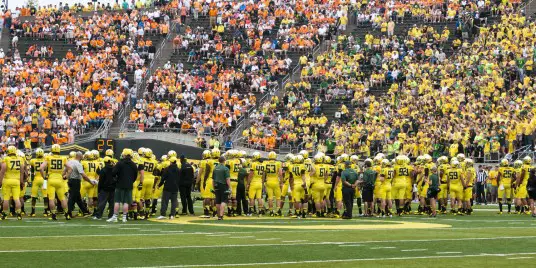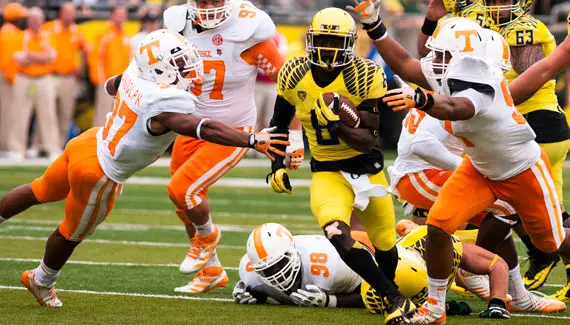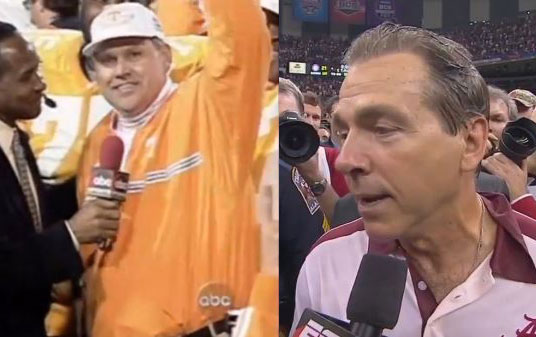Craig Strobeck
It has been labeled as the top conference in all of college football. That is the reputation the SEC has been adorned with, largely on the back of its member schools having won seven consecutive BCS National Championship Games; something the conference has no problem buying ad time to remind you about:
Amazingly, that streak has been accomplished while Tennessee, the program that won the first-ever BCS Championship for the conference, has been largely irrelevant in the college football landscape.
Since the conference’s title streak began in 2006, the Volunteers have a 47-42 record, which is serviceable, but not what is expected out of the second-winningest program in the conference’s history[1]. They haven’t had a winning season since 2010, and haven’t lost fewer than 6 games since 2007. That may not seem a long streak of futility, until you realize that when former head coach Derek Dooley departed from Knoxville last fall, he was the first coach to leave Tennessee with a losing record since W.H. Britton in 1935.
As we enter the final season of the BCS, the narrative on this 16-year window of college football is nearly complete. It was a period marred with great controversy, and one where half of the titles were won by the SEC. The conference hasn’t failed to crown a champion in a title game it had a participant in.
While the majority of the story of the BCS era is written, Saturday’s game served as a fascinating juxtaposition to reflect on where we came from, and where we are at the era’s end.
In 1998, the first year of the BCS, the Tennessee Volunteers were a program so dominant that they lost starting quarterback Peyton Manning to graduation, and got better. After finishing 11-2 in 1997, Manning’s final season, Tennessee managed to go 13-0, winning the first ever BCS National Championship over ACC champion Florida State, 23-16.
That same year, the Oregon Ducks finished 8-4, ending the season in rough fashion by suffering two heartwrenching losses. Their regular season ended with a double overtime loss to then-conference doormat Oregon State, who finished with the second worst record (2-6) in the conference, a week after the Beavers had secured a losing season for the 28th consecutive year[2].
The Ducks’ bowl game was equally painful, losing 51-43 in the Aloha Bowl to Colorado and head coach Rick Neuheisel; with the Ducks failing to exact revenge on Neuheisel for his decision to fake punt in the fourth quarter of a Cotton Bowl blowout three years earlier. It would be Neuheisel’s final game as the head coach of the Buffaloes, as he was lured away by the University of Washington that offseason for a $1 million per year over seven years, an amount so large that the only other coaches paid that much at the time – Steve Spurrier, Bobby Bowden, and Phil Fulmer – had all won national championships at their schools[3].
Fast forward to 2013, the final year of the BCS: That same Tennessee program would play a game at Oregon in which they came in as a four-touchdown underdog, and left suffering their worst loss in 103 years[4], while the aforementioned Neuheisel would recap the events of the game as a television broadcaster for a network that didn’t exist when he last coached.
The college football world has changed.

Tennessee fans had a strong presence at Autzen Stadium last Saturday but were still lost in a sea of yellow.
I sat next to a Tennessee fan[5] at Saturday’s game[6], who said, “I think you guys will win it all, it looks like you have the best team in the country.” My friend and I cringed at his statement, to which he responded, “You guys not agree?” I informed him that we were from an old guard of fans, many of whom remember far enough back to when Oregon wasn’t a powerhouse program, and how so many attempts in recent years to break away from that old status ended with the scars of many a heartbreaking late-season loss that felt cruel in a pre-ordained way, as though the college football universe was responding to Oregon’s daring attempt to defy its order, that it made believing in such a destiny hard to anticipate.
I told him a win over this Volunteers team would be huge for the old guard of fans, that defeating a historic SEC program of Tennessee’s magnitude in Autzen Stadium would have been unfathomable years ago. His response: “Really? Because we suck this year.”
Maybe it’s time the old guard adopt this new reality, one that the student section demonstrated an understanding of as they chanted “We want ‘Bama!” early in the second quarter of Saturday’s win. Many of them have no memory of old days, because in their short lifetimes the Ducks have won six conference championships, played in three Rose Bowls, three other BCS bowls, including a national championship and had eight 10-win seasons in the past 13 years. Beating Tennessee might have been a huge accomplishment when the era started, but for the new guard, beating them means as much as the Virginia win did the week prior.
They are unafraid of Alabama because they understand that past performance isn’t a predictor of future success. The SEC may have won seven titles in a row, but that has no bearing on whether they win an eighth. They know five of those seven champions had one loss, and that no AQ team outside the SEC has been left out of a national championship game if it went undefeated. AQ teams control their own fate.
The SEC may have the streak, but three weeks into this season, they have been on the wrong end of a few non-conference matchups; having been on the losing end of its most nationally visible non-conference games (Clemson vs. Georgia, Miami vs. Florida, Tennessee vs. Oregon) three weeks in a row.
Sure, Tennessee’s game against Oregon wasn’t the conference’s marquee contest of the week, that was Alabama vs. Texas A&M, but in winning that game, Alabama showed both the strength and vulnerability to make a long-anticipated matchup with Oregon that much more intriguing. Or as Adam Kramer best described the public’s unsatisfied appetite for the pairing of the Ducks and Tide: “[L]ike two heavyweight prizefighters unable to reach an agreement despite the public’s vocal push.”
The old guard may approach this season with trepidation because of history, but if history is any indication, they should look forward to it. The BCS National Championship Game is in Pasadena this season, and hopefully this season will mirror the last two title games at the Rose Bowl.
Both times previously, the game featured two undefeated programs that had clearly separated themselves from the rest of the country meeting for the title. One of those games was the famous 2006 game between USC and Texas, with the former going for its third straight title[7], while the latter’s chance for victory was largely dismissed despite going undefeated that season – largely forgotten because, despite winning a BCS bowl the year prior, the public dismissed the accomplishment for not winning its division when it did so.
Given the shootout we saw between Texas A&M and Alabama last Saturday, and the promise of a matchup with Oregon’s prolific offense that could bring, such a game might be the perfect conclusion to an imperfect era of crowning a champion; a perfect valediction to 16 years of rapid change in college football.
When hoping for that perfect ending, I can’t help but think back to the beginning of the BCS era, and Oregon’s very first game of the 1998 season, a 48-14 Duck win over the Michigan State Spartans. Their coach? Nick Saban. Hopefully, Oregon’s final game of this era will serve as the perfect bookend, finishing the same way it began: with Saban on the losing end of a Ducks victory.
[1] Tennessee’s 801 wins all-time ranks second only to Alabama’s 829.
[2] An all-time record, by the way.
[3] Armstrong, Ken and Perry, Nick (2010) Scoreboard, baby: a story of college football, crime and complicity Lincoln, NE: University of Nebraska Press.
[5] Who, predictably, couldn’t have been nicer.
[6] I have to, by decree of the universe, sit within an arm’s length (not an exaggeration) of an opposing team’s fan at every major Duck game despite always having seats in an Oregon section. Recent examples include: 2010 Rose Bowl, 2011 BCS NCG, 2011 USC, 2012 Rose Bowl, and 2012 Stanford.
[7] Since vacated.
______________________________________________
Announcements
*Check out our new pregame opponent analysis on Saturday mornings. Our analysis will be unlike any other, so learn what to watch for before the game on Saturday!
*Want some College Football humor? Check out FishDuck.com‘s GIF Collection! (Click here) Pass it along!
*If you would like to join the other 80+ volunteers at FishDuck.com, and have five hours a week to donate . . . we have slots open for volunteer Editors, Writers, Analysts, Photo Archivists and Social Media Associates. Can you help us manage people? Consider our volunteer Sales Manager and HR Manager positions and give some time each week to help young associates learn! E-mail us at charles@fishduck.com.
Related Articles:
Chip Kelly Update: Everything's Good Again ...
Chip Kelly Update: Wailing and Gnashing of Teeth
Shock and Awe -- The Oregon Ducks' Football Hangover Effect
Despite Lopsided Score, Georgia State "Never Stopped Believing"
Hope Springs Eternal for Ducks
Incompetent Pac-12 Officials: How Do You Miss ALL of THIS?
Nathan Roholt is a senior writer and managing editor emeritus for FishDuck. Follow him on Twitter @nathanroholt. Send questions/feedback/hatemail to nroholtfd@gmail.com.



